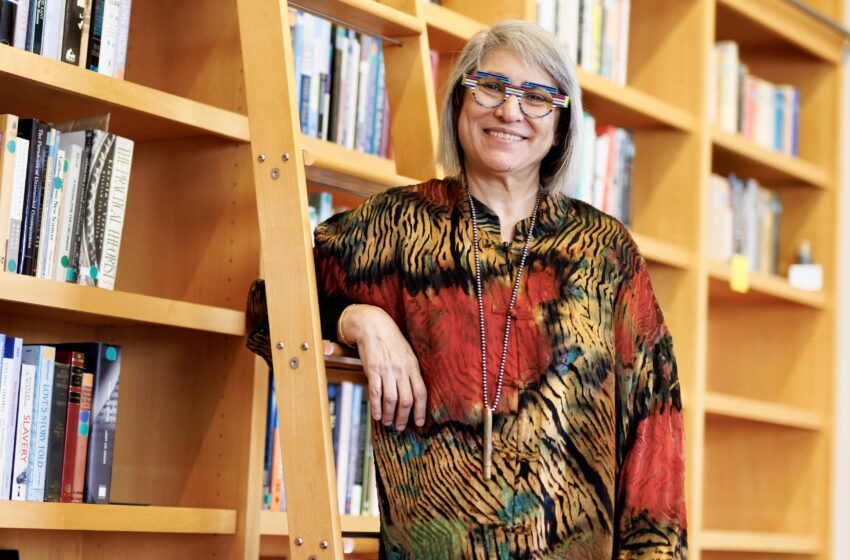Mahzarin R. Banaji wins Frontiers of Knowledge Award

Mahzarin R. Banaji, Richard Clarke Cabot Professor of Social Ethics, photographed in their office and library in William James Hall on the campus of Harvard University. Banaji co-authored a new study revealing that ChatGPT displays humanlike irrationalities. Niles Singer/Harvard Staff Photographer
India-born social psychologist wins the prestigious 400,000 Euro award for advancing knowledge about human attitudes
By Arun Kumar
Indian American social psychologist Mahzarin R. Banaji has won a prestigious BBVA Foundation Frontiers of Knowledge Award in social sciences. for advancing knowledge about human attitudes with four other American professors.
Banaji, Richard Clarke Cabot Professor of Social Ethics in the Department of Psychology at Harvard University and four other social psychologists, all based at universities in the U.S., accepted the award in Bilbao, Spain, last week.
READ: Vijay Kumar wins James Beard Award as New York’s best chef (June 17th, 2025)
Their collective contributions have revolutionized how attitudes are understood and measured, with impacts that ripple across fields including psychology, sociology, and political science, according to Harvard Gazette.
Established in 2008, the annual prize recognizes excellence in science and the arts, with a focus on people making highly original contributions that achieved widespread impact.
Endowed by the BBVA Foundation, the nonprofit arm of the Spanish banking group BBVA, the award comes with an unrestricted 400,000 Euros per each of its eight categories.
Banaji and 19 other winners arrived in the striking Basque city, famous for its Frank Gehry-designed art museum, to find their photos splashed across airport signage and lamppost banners, according to the Gazette.
“In choosing to recognize the five of us, born in the 1930s, 40s, 50s, and 60s, in bringing the world’s attention to these ideas and discoveries, you recognize not only us but our intellectual ancestors who surely imagined but did not live to see a thriving science of attitudes became worthy of a recognition such as this,” Banaji said in her acceptance speech.
Banaji was specifically recognized with the University of Washington’s Anthony Greenwald for work that improved the prediction of hidden biases. Their influential Implicit Association Test was introduced on the World Wide Web in 1998, when Banaji was a professor at Yale University.
“The single most decisive event of my early career was meeting and working with Tony Greenwald,” shared Banaji, who moved to Harvard in 2001.
“In our early work, we prioritized the development of a method to measure implicit attitudes and beliefs, and it is today the most widely used instrument to study attitudes and beliefs by a simple count of published work.”
Banaji’s speech also touched upon more recent work, with her lab currently pursuing multiple investigations into machine psychology. “I can tell you that human attitudes and beliefs are clearly embedded in large language models, often emerging from LLMs even more starkly than in humans,” she said.
“Given the rapid and unregulated evolution of AI today, perhaps this BBVA Foundation Award will serve to alert the corporate owners of AI to more thoughtfully consider a technology powerful enough to determine the future of life on Earth.”
Born and raised in Secunderabad, India, Banaji earned her BA from Nizam College and an MA in psychology from Osmania University in Hyderabad. Banaji taught at Yale from 1986-2002 where she was Ruben Post Halleck Professor of Psychology before moving to Harvard.
Banaji studies thinking and feeling as they unfold in social context, with a focus on mental systems that operate in implicit or unconscious mode.
She studies social attitudes and beliefs in adults and children, especially those that have roots in group membership. She explores the implications of her work for questions of individual responsibility and social justice in democratic societies.
Her current research interests focus on the origins of social cognition and applications of implicit cognition to improve individual decisions and organizational policies.

